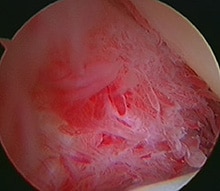Capsulitis – An Overview
Capsulitis of the hip is an uncommon condition. It is similar to adhesive capsulitis of the shoulder or frozen shoulder. It appears more commonly in women than men and generally affects those aged between 30-55 years.
In most cases it occurs without any reason but can follow trauma or surgery to the hip. Similar to frozen shoulder, the condition is more common in people with diabetes.
Capsulitis of the hip causes pain (usually felt in the groin but sometimes in the buttock as well) and stiffness that affects all hip movements (flexion, rotation and circumduction). The condition runs through various stages – acute (pain with reasonable preservation of movement), freezing (pain and progressive loss of movement), frozen (pain and marked stiffness) followed by a thawing phase (where pain starts to resolve first and then movement returns). The condition can last from a few months to a few years before resolving.
It is not well understood why capsulitis occurs. What is known is the condition has an inflammatory basis which affects the synovial lining tissue of the joint and this is followed by a progressive fibrosis of the hip capsule (the envelope of soft tissue that surrounds the joint) and it is this capsular tightening that causes loss of motion.
Figure 1. Inflammation of the synovial lining of the hip.
Diagnosis
The diagnosis of capsulitis of the hip is made mainly on clinical grounds – noting the history of pain which is generally constant and present at night (not relieved by rest) and associated with restricted movement in all directions detectable on clinical examination. A plain xray is essential in the diagnosis of most hip conditions. In capsulitis the xray is normal. The only other hip condition that could cause constant pain and restricted hip motion is an advanced arthritis, which is easily visible on plain xray. MRI scan can be helpful in some cases of capsulitis – particularly those which follow previous surgery.
Treatment
Treatment is usually supportive (simple measures designed to make the person more comfortable), whilst awaiting the condition to thaw out and resolve, which it does in most cases. Local heat, simple analgesics and anti-inflammatory medication can be helpful together with a gentle stretching exercise program. Vigorous activity and aggressive exercises should be avoided.
In some cases injections of steroid and/or manipulation of the hip under anaesthesia can be undertaken. Surgery is generally not performed except in cases of severe hip contracture (stiffness) that persists after the capsulitis pain has subsided.

